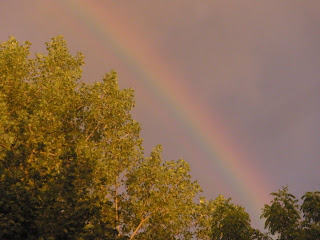Bear patiently the cross of grief or pain.
Leave to thy God to order and provide.
In every change, He faithful will remain.

Lots of change going on in my life these days. In less than 5 days I will be making my way across the country to a new job in Scottsdale, Arizona. I must say I never ever thought of living that far away from New England. I never really thought about leaving New England until recently. I have loved living here, and was especially enjoying
it this summer, having the luxury of not working and thus the freedom to travel at will any and every day.

But now, I'm about to embark on a new adventure. The uneasiness I feel when I think of leaving my family so far behind is tempered by the comfort of the verse above. Be still my soul.
Photos: The view around Thunderbird Academy where I will be working; building where my classroom is (the right hand door).









 The afternoon conversation was spurred on by a presentation by Lisa Stepanski from Emmanuel College on "The Friendship of Bronson Alcott and Mary Baker Eddy." Turns out Eddy sent an early copy of her Christian Science manifesto, Health and Science, to Bronson Alcott hoping that he'd read and publicize it--which he did. They corresponded back and forth briefly about it, and this information led to a discussion about mid-19th century religion and spirituality which I found most interesting, and which may well lead to some independent research of my own in the near future. If I get to it, I'll share it here!
The afternoon conversation was spurred on by a presentation by Lisa Stepanski from Emmanuel College on "The Friendship of Bronson Alcott and Mary Baker Eddy." Turns out Eddy sent an early copy of her Christian Science manifesto, Health and Science, to Bronson Alcott hoping that he'd read and publicize it--which he did. They corresponded back and forth briefly about it, and this information led to a discussion about mid-19th century religion and spirituality which I found most interesting, and which may well lead to some independent research of my own in the near future. If I get to it, I'll share it here!






